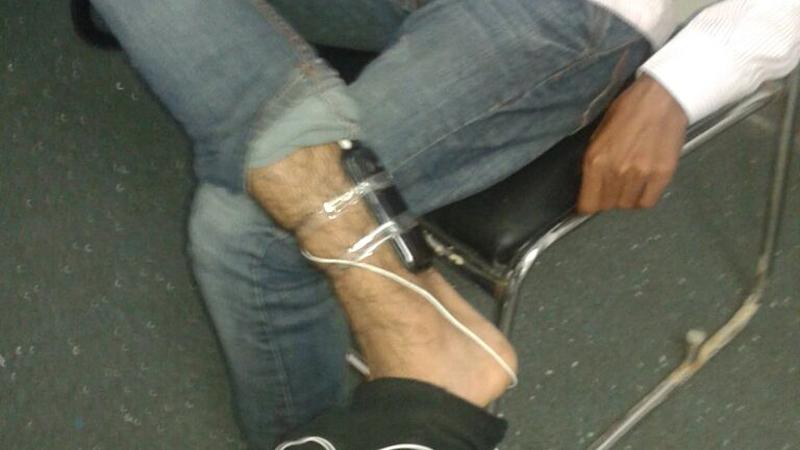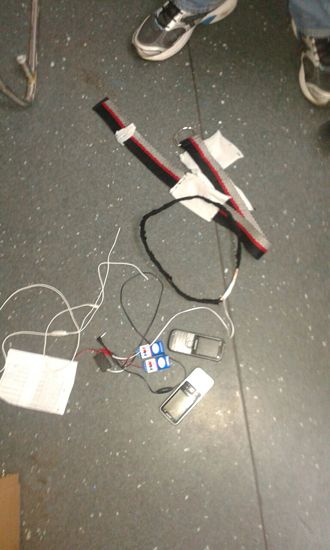
Amateur Player Caught Cheating At Tournament In New Delhi
A chess player was caught cheating at the Dr. Hedgewar Open in New Delhi. The 1500-player, who beat several much stronger opponents, was caught after round five carrying two mobile phones strapped to his legs.
Photos by Dharmendra Kumar.
Only two-and-a-half weeks after the Nigalidze story at the Dubai Open, the chess world sees another cheating case. Nineteen-year-old Dhruv Kakkar was caught with two mobile phones strapped to his legs, batteries hidden in a belt around his waist and a micro-speaker inserted in his left ear.
This way he was able to communicate with a friend, located more than 200 kilometers away, who had access to a chess program.
The incident happened in the fifth round of the Dr. Hedgewar Open which is currently under way at the Thyagraj stadium in New Delhi. The player, who has a FIDE rating of 1517, had just beaten GM Pravin Thipsay after winning against a 1900-, a 2100- and a 2200-player.
The tournament is not using electronic boards to transmit the games live on the internet. However, Mr Kakkar used a form of cheating that can happen on any chessboard.
Chief arbiter Dharmendra Kumar, who took photos to collect evidence, told Chess.com: “He was using one phone to receive messages, and the other to transmit.”

A friend would mention moves, and Kakkar would tap with his foot to affirm when the right move was played. His friend would then feed it to a chess program, and mention the reply suggested by the computer. Kakkar communicated with his friend via a micro-speaker in his ear.
During his game with Kakkar, GM Thipsay reported to the arbiter about strange behavour. At first, Kumar decided that play should continue, and he started to observe Kakkar.
“I was looking at his body language,” said Kumar. “He was taking almost common time intervals for his moves. Even for obvious moves he was taking the same time. Suppose someone plays bishop takes knight, and you have do knight takes bishop, it is very obvious but he was taking time.
“The game was about to finish and after some move. Thipsay resigned. He looked towards me, and I told Mr. Kakkar to follow me.”
The arbiter decided to search the player in a separate room, which a new anti-cheating rule allows. “I first checked his bag, where I found a pair of batteries. Then, after manually frisking him, I found a loop, something that looked like an Indian locket, around his neck.
This was hidden behind his shirt. Below his shirt I then found a belt, batteries and wires. Below his trousers I discovered two mobile phones, one on each leg, just above the ankle, strapped with tape.”




Remarkably, Kakkar admitted to The Hindu that he used the contraption to win the first four rounds and was quoted: “I made this device and practiced with my friend for three days before using it in this event.”
The player was immediately removed from the tournament. The chief arbiter told Chess.com that he will send a report to FIDE, who may ban the player for a period up to three years, and up to 15 years in case of a repeat offense.
The tournament wasn't taking any special anti-cheating measures yet.
“I recommend a jammer, to make mobile communication impossible. But we are not going to do that because tomorrow is the last round. But we will perform metal detection at the section with the top boards,” said Kumar.
The arbiter also warned other tournament organizers: “You actually don't need all this equipment. A small sender and receiver combined with such a micro-speaker is enough to communicate with someone. For top tournaments we must use jammers.”


